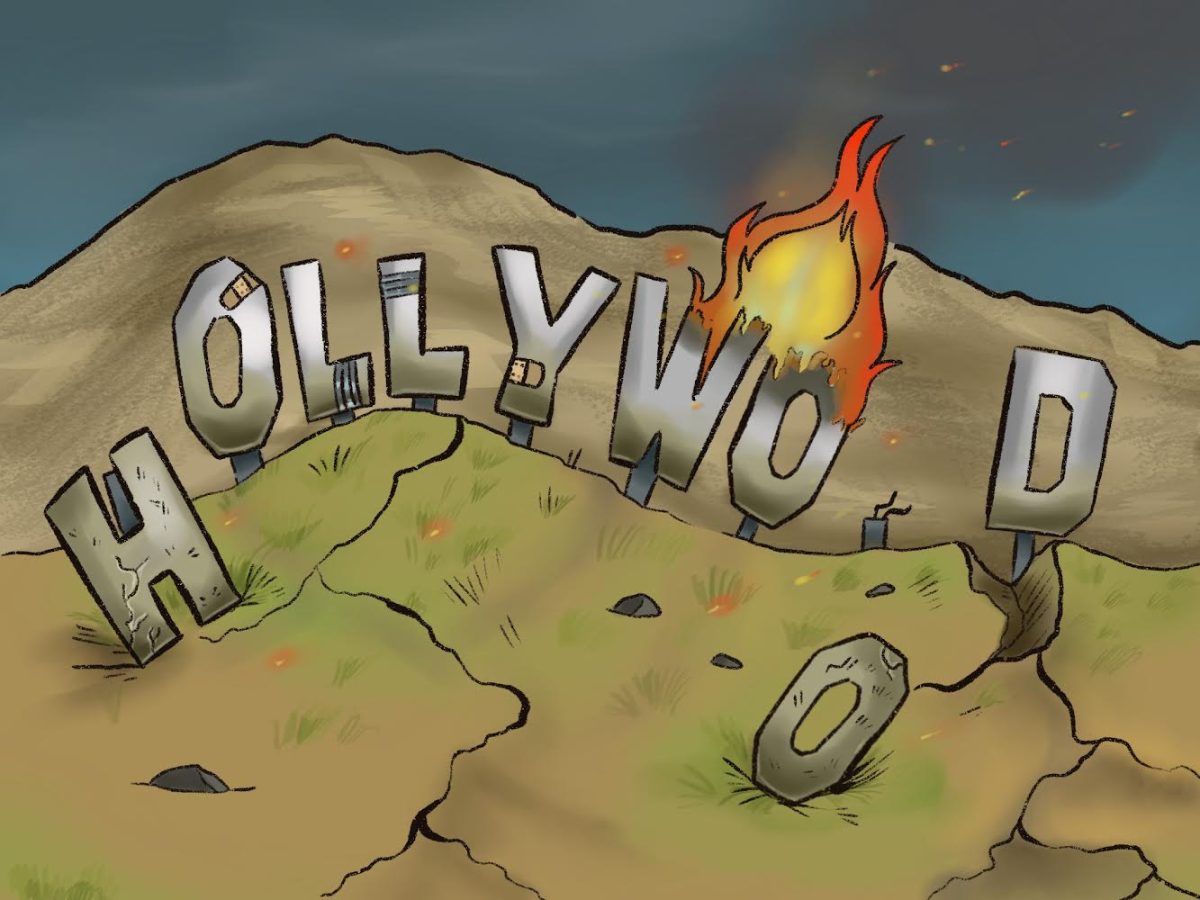It’s no secret that the movie industry struggled for most of last year. Recovering from the pandemic, Hollywood tried to resume their pre-Covid behaviors, with mixed results – both financially and critically.
2021 and 2022 were what I have dubbed ‘trial years’, where Covid was still a serious problem for the industry, and where the effect it had on getting people out to physical theaters could be blamed for a movie’s financial failure. 2023, however, was different – Covid restrictions were all but lifted, and Hollywood had it’s chance to test the flexibility and strength of its pre-Covid processes in a post-Covid world.
The result? Well, while it’s hard to evaluate the state of the entire film industry from just one year, it’s safe to say that at the end of 2023, the film industry is looking – rocky.
It’s easy to look at the big hits and assume this year went well. A handful of films did succeed, such as Wonka and the Super Mario Bros. Movie, both of which far exceeded their already high financial expectations. The Eras Tour movie became the highest grossing concert film of all time, and of course, Barbenheimer – the double film, smash-hit phenomenon that rocked pop culture for the whole year, claiming a record breaking number of honors at many award shows.
For the rest, 2023 dealt a number of brutal blows. I’ve landed on a set of key reasons for why this is.
Ballooning budgets
Arguably the biggest reason for the financial failures of the year are the increasingly expensive production of film. This is influenced by a number of factors in the industry right now, such as the rise in salaries for actors, the increasing importance of special effects, and the prevalence of established IP films, which require money to be spent on buying the rights to the property.
All of these conditions mean that movies like Indiana Jones and the Dial of Destiny, a legacy sequel to one of film’s most successful franchises, was projected to have lost Disney almost 100 million dollars despite raking in 385 million at the box office. It’s budget? A horrifying 300 million dollars.
For movies like Dial of Destiny, Marvel’s list of flops, and other action movies, a majority of the budget issues lie with special effects. As movies become more and more technically complicated, each movie tries to up the ante more and more to top the previous film. However, as the standard rises more and more, so do the budgets. This is how movies like The Marvels, which 10 years ago would have been a smaller budget film released between blockbusters, catapulted it’s way to a nearly 300 million dollar budget (and hardly making any of it back).
Everything is a blockbuster now
The budget issues lead into another problem – most of the major studios are trying to release more and more ‘blockbuster’ releases, sometimes up to 10 per year. In previous decades, the year would be headlined by a few blockbusters, and filled in by smaller releases, indie films and arthouse pieces. However, with so many companies competing now, the market has been flooded with movies constantly trying to one-up each other.
Instead, most of these movies fail, as the companies try to stretch people’s interest in a property to the limit. For most, going to a blockbuster film twice a month is simply too much, either not having enough time to, not having enough money, or both. Most of the year’s biggest releases failed because of this.
Strikes, strikes, and more strikes
On top of the already present issues, this year’s actor and writer strikes sent shockwaves through the industry. In 2023, the strikes slowed down film production, and hampered production company’s ability to produce original material at a consistent rate, as well as making film production more costly due to higher wages. I agree completely with these protests, and support actors and writers in their fights for fair wages, but it was undeniably a factor behind this year’s film upheaval.
While the strikes have officially ended, it is certain than movies continuing to come out in the next few years will have been affected, as their productions occurred during the protests, This may include a lack of original concepts, increased sequel production for well-known franchises, and more.
The rise of streaming
The shift has been more than noticeable – in the past 5 years, and particularly since Covid, streaming services have begun to dominate the world of entertainment. Netflix, Disney+, Hulu, Peacock, and dozens of others have already all but taken out cable television, and the changes they have caused to the film industry is almost as large-scale.
For many moviegoers, this has completely changed the game, as going to a physical movie theater building has been rendered a luxury, and unnecessary. If you are interested in a movie, but not interested in driving to the nearest theater or spending $20 or more on a ticket, you can wait until the movie comes to streaming.
And movies are increasingly coming to streaming too. Many companies did this over Covid – for example, Pixar released Soul, Luca, and Turning Red all exclusively on Disney+ and not in theaters – but the practice is becoming more and more common for companies that are unsure of the potential financial gain from a film. Such examples include Glass Onion, the sequel to Knives Out, releasing only on Netflix, despite the original coming out in theaters.
So, given all of this, where are we headed?
2023 was undeniably a brutal year for Hollywood. Between the budget problems, critical disasters, strikes and more, the year clearly shook the entire industry. Given all that we know, it can be said for certain that film is heading in a different direction than what we were expecting during the depths of Covid. Here are my biggest takeaways and expectations going forward, given what this year has shown us:
The superhero era is over
The past decade has been, to put it lightly, superhero mania. Starting up with the explosive success of Marvel, and growing ever bigger with DC, Sony, and other projects from dozens of other companies, taking classic comic book characters and translating them to the big screen has been a success.
But it seems that method of film making is over. With Marvel’s budgets exploding at each successive film does worse than the previous, and with the disastrous critical receptions of this year’s DC projects, superhero blockbusters seem to be losing their edge.
Name recognition is everything
More than any other previous year, 2023 was dominated by name-brand movies. It of course has the same sequel curse as previous years – 4 of the top 10 highest grossing films are sequels – but also remakes of classic films take up 2 slots, with Wonka and The Little Mermaid.
But what I find to be the most interesting is the prevalence of ‘brand films’: Mario, Barbie, and Oppenheimer. All three of these films follow the increasing trend of taking a well known brand, toy, or in Oppenheimer’s case, a person – and writing them a kitschy or politically-minded script and releasing a film. And the numbers speak for themselves: these are the three highest grossing films of the year.
In the coming years, expect more films based on recognized characters. Mario is already greenlit for a sequel, and close to a dozen potential Mattel-related movies are in the works right now. As well, more biopic films, such as the upcoming Amy Winehouse film and Timothée Chalamet starring as Bob Dylan sometime soon, are coming to the spotlight as financial juggernauts, with a story already written. So don’t be surprised when Universal comes out with Oppenheimer 2: Nuclear Boogaloo.
Streaming and theaters need to find a happy medium
As streaming has rose to top prominence in the entertainment industry, many have assumed that the era of brick and mortar theaters is long over, Covid acting as the final nail in the coffin. But the money speaks for itself – people love going to theaters every now and again, especially with movies like Barbie or Wonka that constitute an entire cultural event. Film can be a communal event, and it’s clear that many still enjoy that.
Streaming is here to stay, but it has been showing it’s cracks in the past few years. Disney+ has been revealed to be a net profit loss for Disney, and as more and more streaming services pop up, consumers are becoming increasingly irritated by their favorite franchises being split across a dozen apps.
I believe strongly that streaming is here to stay, but I think that in the years to come, physical theaters and streaming companies will need to find a middle ground in order to keep both formats healthy.
The movie industry is on unprecedented ground right now, without a doubt – but what needs to change is clear. Hopefully, the major companies, writers, actors and actresses will act on these changes and make film a more stable medium going forward.

































